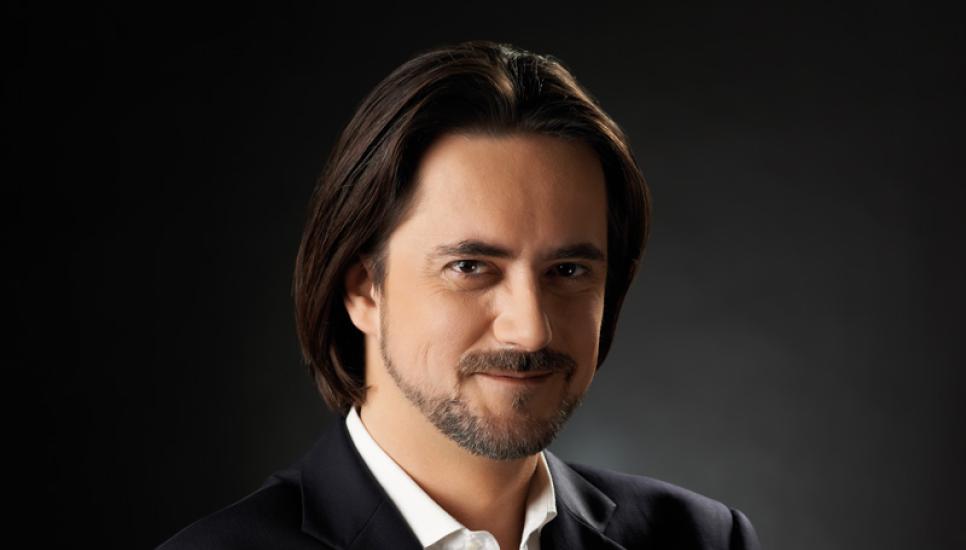Young at heart: Cyril Camus on succession and cognac

French cognac producer Camus may have been around since 1863, but with geographic expansion in its DNA, a youthful succession model, and partnership with China's largest distiller, it is showing how to match tradition and innovation. Nicholas Moody reports.
Walk from the entrance hall of the Camus family Château “le Plessis” hung with an enormous sea turtle shell, shark jaws, and Pacific Island spears, you slip from a intimate dining room, past a 30-person dining room, until you come to a small wooden door. Inside is the Camus 'caveau', where generations of family members have sat on modest wooden stools sipping old Borderies eaux-de-vie – barrels of cognac drawn from the immediate area that are only tapped for special occasions. Drinking in the atmosphere of the château's cellar, or walking through the seemingly timeless rows of vineyards in full flush at harvest time, it is hard to imagine Camus as a youngish, challenging upstart.
But the cognac producer Camus still sees itself as “the new kid on the block” - despite being 153-years-old. Based in the town of Cognac, France, Camus is today the fifth largest producer of the world-famous variety of brandy and the largest family-owned cognac maison among more than 300 houses.
“Most of the other established cognac houses, the ones that are also known around the world, were established 100-150 years earlier than us,” according to its fifth-generation president (and sole shareholder) Cyril Camus. Camus is right to give itself this upstart moniker, its main competitors (all with a degree of family ownership) are the four major houses: Hennessy (owned by LVMH), Martell (owned by Pernod Ricard), Rémy Martin (owned by Rémy Cointreau), and Courvoisier (owned by Beam Suntory), who account for around 85% of the global cognac market with Camus' slice sitting at 5-6%.
Does Camus think this sense of it being the young upstart, the little brother against its bigger competitors, still exists?
 “Yes. And frankly as a manager of a company you want that. It's a lot easier to lead the teams when you are the challenger than when you are at the front. So yes, it's a great asset to be in that position. In a way they are still within reach of the leaders,” says the 45-year-old.
“Yes. And frankly as a manager of a company you want that. It's a lot easier to lead the teams when you are the challenger than when you are at the front. So yes, it's a great asset to be in that position. In a way they are still within reach of the leaders,” says the 45-year-old.
This maverick mindset has remained remarkably resilient throughout its history and flows from its founder Jean-Baptiste Camus who organised a group of producers to sell cognac under the brand 'La Grande Marque' in 1863. (They are no relation to the famous Nobel prize-winning author Albert Camus). The founder's entrepreneurial zest, its positioning as a high-end product, combined with its early forays into foreign markets, has set the course for the way the Camus family approaches its business to this day.
“[From the outset] it was very internationally-oriented, because I think there was a common belief [in 1863] that it was easier for a cognac company to establish itself where the others were not so present, than try to gain market share in an already established market,” he says.
England was the first export market for Camus starting in 1870 when 7,000 casks were shipped to London that year. The second generation under Gaston Camus then expanded into Eastern Europe and Russia in the early 20th century, becoming the official cognac to the Last Tsar in 1910. Cyril's grandfather, Michel, pioneered duty-free retailing when he started doing business with US group DFS Galleria in the early 1960s, while Cyril's father, Jean-Paul, launched into Asia.
“From a very young age, my dad took us, my brother and me, on trips to discover the world. I remember the intense shock I felt when I happened upon a Camus bottle in a liquor store in New York … It was there, at that precise instant, that I really grasped the international dimension of our maison,” Cyril recalls in the family's 150th anniversary book.
Fascinated by China's dynamism (after having to travel to Bordeaux for Chinese lessons as no high schools in Cognac offered it), he pursed his studies at UIBE in Beijing, after graduating from Babson College, US. He joined the family business as director of commercial relations in 1993.
 Since becoming president of the company in 2003, Cyril has developed the company internationally, opening offices in China, the US, Russia, Vietnam, and Japan.
Since becoming president of the company in 2003, Cyril has developed the company internationally, opening offices in China, the US, Russia, Vietnam, and Japan.
Living in Shanghai, he founded the Yuanliu distribution company in 2007, not only for Camus Cognac, but also other third party spirits companies. Since 2005, Camus has been the exclusive distributor of Moutai – China's most popular brand of baijiu white liquor – in worldwide duty free.
Today, Cyril heads the company which counts 340 employees in eight countries on three continents. Camus products are sold in most countries in the world, in almost every international airport and on board a large number of airlines.
“One thing that is really clear when you look at the history of the company, is the need for every generation to go beyond what the previous one had done. We had the will to build on the past and create a larger future for the company,” he says.
This desire to innovate by pushing into new markets has not affected the family's core focus on what it does best: making good cognac. It is an attitude reflected in a quote by Jean-Paul: “Making a great cognac is easy. All you need is a great-grandfather, a grandfather and a father who have done it before you.”
“We do keep all our eggs in one basket,” notes Cyril. “There has never been a notion of wanting in the family to create either wealth or businesses outside of cognac. We've always been very, very focused on cognac, and doing the same thing your previous generation was doing is also a great incentive to innovate within your industry.”
Examples of innovation have included the early move into markets like Russia, and Vietnam, the push into duty free shopping, and starting to package cognac in distinctive crystal decanters, rather than simple bottles.
Gunnar Svedberg is a cognac specialist and author of Cognac – winner of the 2015 Gourmand Award for the Best Spirits Book in the World. He agrees that Camus is a creative and innovative house with some unique products in its range.
“The best example of the company's innovative capacity is probably their bold move to introduce a series of three cognacs from the island of Ile de Ré (near La Rochelle) ten years ago. Cognacs from this district have traditionally been looked down upon but thanks to the fact that vinification and production methods have improved greatly, Camus has managed to prove that their Ré cognacs are highly palatable,” he says.
 Perhaps the greatest driver of innovation and entrepreneurialism at Camus has been its single owner model – an unwritten rule, but very much enforced. The model requires one family member in each generation to assume 100% ownership of the business, and in the past three instances, that has been at a very young age.
Perhaps the greatest driver of innovation and entrepreneurialism at Camus has been its single owner model – an unwritten rule, but very much enforced. The model requires one family member in each generation to assume 100% ownership of the business, and in the past three instances, that has been at a very young age.
“My father took over the company when he was 32, my grandfather was 23, and I was 32,” says Camus. “There is no rule that says it must be at 32, but there is a sentiment that the transition should be done early so that we have to innovate our way to growth.”
“Entrepreneurship is probably more in our blood than cognac itself, although cognac is the way we choose to express our entrepreneurial spirit.
“It's also linked to the way that we transition the company. Entrepreneurs tend to be in their prime when they are a bit younger, in terms of ideas, not in terms of success. So we think that the ideas you bring in as a young person, outweigh any potential risk in getting it slightly wrong, in terms of management.”
For Cyril, this meant having to buy his older brother, Jean-Baptiste, out of the 50% share passed down to him by their father in 2003. Jean-Paul had bought out his own brother and sister, although both these transitions were easier than for his grandfather who had to buy out seven of his siblings and cousins.
“I couldn't necessarily buy out my brother from my bank account. So you borrow. You get into debt. So when you take over the company through a family buy-out, you better do it when you are young so you have enough time to pay what is due, and still enjoy part of your life!”, he jokes.
Was that a difficult discussion to have with his older brother, Jean-Baptiste?
“There is always an understanding that one will transfer his/her equity, and one will consolidate it,” says Cyril. His brother has chosen a vastly different career, in forestry and hunting.
“The fact that it is done very early on, forces whoever takes on the company to actually grow. And that forces us to be entrepreneurial. There is no way you can manage to do that if the company just stays where it is,” Cyril emphasises. “You grow yourself out of debt”.
Camus is a firm believer that early transition also limits the chance for conflict between older siblings, especially in contrast to a situation where an ageing patriarch may be slow to hand over the reins. The recent case in the US of the Redstone family's feud over the succession of CBS and Viacom holdings is living proof.
“[Succession rivalry] can really tear a company apart when there is dissent within the family. For us it happened at a time where there was very low probability of dissent, paying for the kids, and setting up the kids was a very distant thought.”

When asked whether having a single owner might make them more susceptible to selling out at a price that was too good to refuse, Camus disagrees.
“A single shareholder makes the probability of the company being sold outside the family much lower because the temptation to sell usually comes when you don't get the benefits from the shares that you own.”
The transition itself wasn't quite as dramatic, although it was forced by external factors, in Cyril's case the 2003 SARS outbreak in Asia.
From 1998, when Cyril's father stepped down from the day-to-day running of the business, until 2003 the business was run by an executive board made up of Cyril, his brother, and a non-family member. The retirement of the non-family member, plus the outbreak of SARS, created a natural point to end running the business by committee and transfer back to single ownership under Cyril.
“[SARS] had a big effect on our business, our sales in airports dropped significantly, and in bars, that's when people stopped going out. Decisions needed to be made, that's the time when we decided to go separate ways,” he says.
Camus is a strong advocate of transitioning leadership through a supervisory board.
“It's a great way to bring the new generation to the business. It means that I didn't take over after my father, I took over after a management committee. Which is very different indeed.”
Camus comments that leadership often changes hands in a time of crisis and jokes that “cognac, being very cyclical, we are very lucky that we have plenty of crises.”
The most recent crisis has been in a market close to Cyril's heart: China. Just as each of the earlier generations has expanded into new markets, Cyril's focus has been on the Middle Kingdom. He studied in Beijing, his two sons grew up in China, with his youngest, Marc, 12, living there and, late in 2014, Cyril Camus was nominated among the Top 50 personalities having contributed to Sino-French relations since 1964.
The Chinese government's well-publicised anti-extravagance drive, which began in 2013, has had a “really big impact” – China represents 25% of its overall sales volume.
Overnight Chinese authorities banned public sector workers or state-owned companies from spending any money on corporate entertainment, notably cracking down on the practice of toasting at official banquets.
“We are very focused on the high end. Our products were very popular [to consume] in banquets and people wanted to put the best on the table. We are seen as the best in the €400-€600 ($456-$683) a bottle price range. That got very heavily impacted, and that impacted us, more than anyone else,” he says.
In 2015, Camus' revenues slumped to around €100 million ($114 million), having been more than €150 million several years earlier. A large part of the slump was driven by the drop in Chinese sales which had grown from virtually zero in 2000 to represent more than 30%.
Cyril says the future for cognac sales in China remains bright, despite the crackdown, driven by growing demands from the private sector and China's much-feted middle classes. It has also re-organised the way it sells Camus in China.
“China is going to continue playing a very important part in the future of the company. Out of all the cognac companies we are the most committed in the long term to China. For us it goes beyond just the financials and market conditions. My two kids grew up in China for part of their life, and my youngest son is still in China.”
Its long-term future in China may be influenced by its 10 year partnership with Kweichow Moutai Company - the state-owned enterprise which produces Moutai (see box-out).
At the tender of age of 45, is it too early to be discussing his succession? Or too soon for his sons Ryan (16) and Marc (12)? Not if you're a Camus.
“The day we finished the transition of ownership from my father was the day I started moving to transition to my children,” he jokes. “It's emotional but it's too early to figure out which one is going to take over. They both know that this is a decision they will have to make together.”
Ryan has already had a taste – working in the visitors' centre last summer – while both boys have joined him on business trips.
 If it's too early to speak of succession, what about Cyril's legacy – does he have a sense of that?
If it's too early to speak of succession, what about Cyril's legacy – does he have a sense of that?
“Total geographic coverage is one – selling our cognac in all the countries we're allowed to sell it,” he jokes.
The other is a more altruistic ideal: going into bat for the family business model.
“In the early 2000s, there were 10 years where if I were to tell people I ran a family business, they would say, 'How come you haven't sold. Is your business that bad?' It just was not normal, and there was loss of respect for the family business model. People thought that it was not as efficient, not as good, and did not create as much value or wealth as a corporate, or the highly-leveraged model.
“Studies show that in times of crisis family businesses are a lot more resilient. They do create less value in times of growth, but retain much more value in times of crisis. So overall, family businesses do create more value. And it creates a hell of a lot more social value,” he says.
“We have one case where the grandparents were working for the company. There's a sense of community around the company as well that would not necessarily exist in a different business model,” he concludes.
“So yes, I would like to have played a role in ensuring that the family business model is respected.” Challenging conventional thinking, just as the Camus family has done since 1863.






